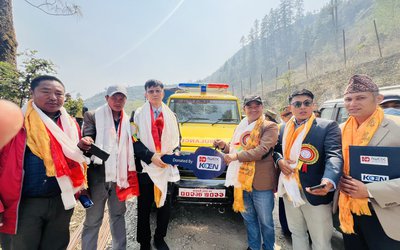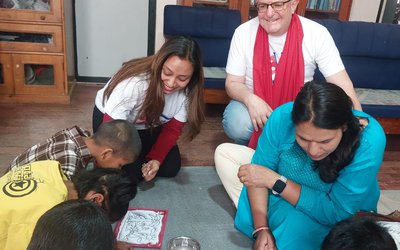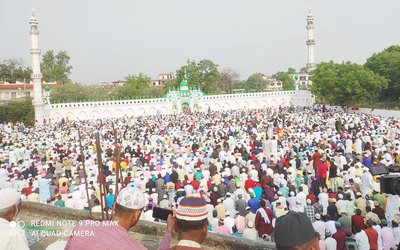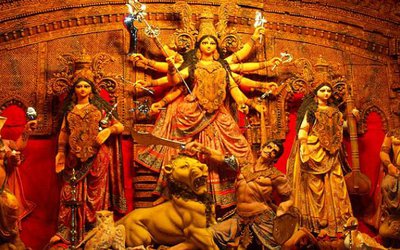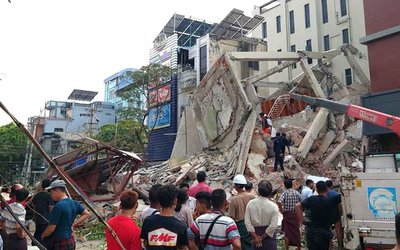
As Nepal is passing through a major crisis following the earthquake, IM Swedish Development Partner, a Swedish INGO, has come to Nepal to provide essential support. BIRTHE MULLER, chairperson of the organization, spoke to NEW SPOTLIGHT during her visit to Nepal. Excerpts:
You have made three visits to Nepal. What changes do you notice in Nepal after the major earthquake?
My three visits have been quite different. As I travelled to Nepal in 1970 as a first time visitor, I was not aware what was going on as I am today. In 1985, I visited some projects in Nepal. However, I am very impressed this time as I met and saw what has been going on. We met with good and reliable partners who are dedicated to the issue of enhancing what is going on as far as building a country.
How do you see the rebuilding process?
The more I think about what we have seen and heard, the more, we think, there is the need of building the country with a new constitution. Because of earthquake, Nepal has had a little hard time. It is important for all of us to be very realistic about what is possible to do and what is not possible to do.
How do you see Nepal's program?
We are very happy that we have a country director with good knowledge about what is in place in Nepal. He has been playing an important role. He has more knowledge about the local situation. I also met ordinary people and people with whom we are working. I see there are real people and there is a chance to do something better. That is a great development and fascinating one.
How do you support the post-earthquake programs?
When we heard the news about the earthquake through different media, we realized we would need to do something at such a crucial time. Our 40,000 private donors really reacted swiftly. As we do not only rely on the external funding, as we do have our own internal funding, we came up with immediate programs for relief. Our 40,000 donors relied on us and supported us to contribute in Nepal. Our donors, who did not work with us before came to us as they acknowledged that we were able to channelize what they wanted to do for Nepal through us.
How do you see the challenges?
We are of course aware of the difficulties and challenges that you have now in Nepal because of earthquake. So many people want to open their hearts and pockets to try to help and it is the huge coordination that is needed and this will be right in the long run and we are very much aware of that and we are very careful.
What is your impression of your field visit?
The visit was quite interesting as we met a number of young women students and women groups. When I asked a question to the students about what they wanted to be in the future, they responded that they wanted to be teachers. As we have been supporting the school children, the answer given by children impressed me. As they see teachers as their role models, our investment is helping the local community realize the importance of education. We also visited an organic farm which has been working with us for a long time.
For how long has IM Swedish Development Partner been working in Nepal?
We have been working in Nepal since the late 1970s as we have been working with Tibetan Refugees. We have been present in Nepal and have gathered knowledge about Nepal even though we did not have an office here. After 2010 we are involved intensively in the development of Nepal.
What is the development approach of IM Swedish Development Partner?
Ours is a bottom-up approach with mass participation of community in development work. From the very beginning, for the founder and the rest of us who have been working with IM, the foremost thing is we believe that all of us are human beings regardless of religion, ethnicity and belonging or anything, men or women or in between.
How do you generally view the work in Nepal?
With the country being a multi-cultural one, with various ethnicities, one needs a specific knowledge to solve the problems. It is quite fascinating to work with such a large number of ethnic groups. Nepal can be a model for conflict solving. I see so many challenges but there lie opportunities as well. The challenge is how you can change the society. Nepal is very much divided politically and ethnically. Every group was telling me this kind of thing when I visited the field. I will follow Nepal's situation with a great interest. This could give something for all of us to learn. I hope you will be successful.
- IME GROUP: Expands Into Paper Industry
- Mar 24, 2025
- CPN UML: Instigated By India
- Mar 23, 2025
- ADB’S CHIEF ECONOMIST: Nepal Reduces Poverty
- Mar 11, 2025
- FM DR. DEUBA: A Successful Visit
- Mar 11, 2025
- MD GHISING: Target Of Personal Grudge
- Mar 09, 2025






